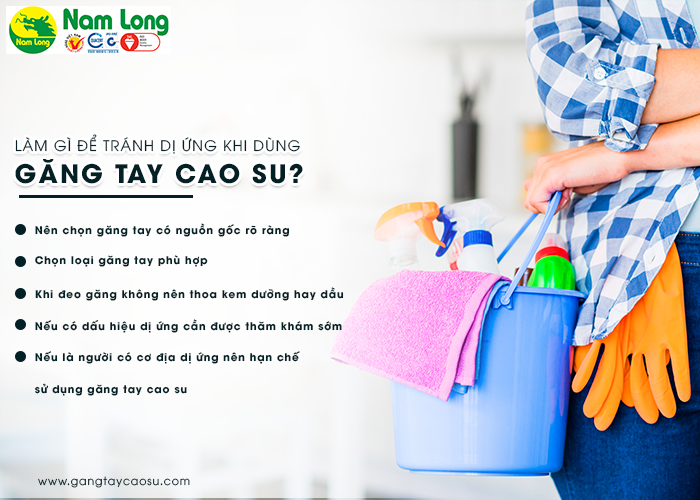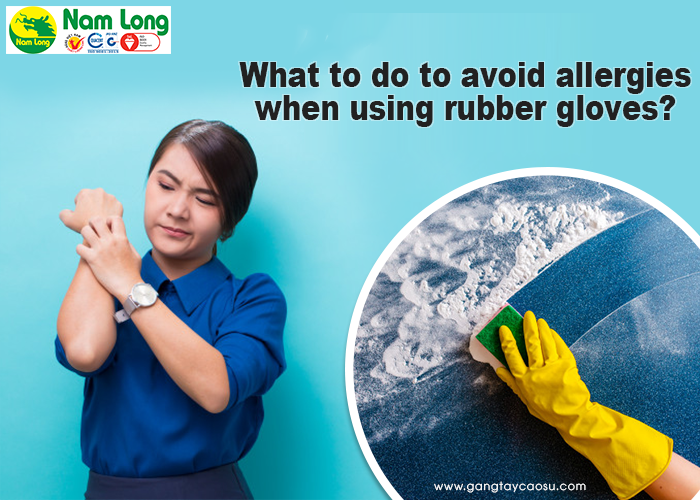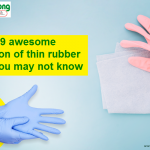The rate of allergy to rubber gloves is low because of the problems related to the body base, so not everyone has to face to. However, if you are allergic to rubber gloves, some of the following tips you'll probably need.
ALLERGIC TO RUBBER GLOVES, NOT ANYONE FACE TO.
Allergic to rubber gloves actually is a reaction to some of the rubber proteins. They usually appear within minutes after exposure to people with allergy and sensitive skin. Symptoms include skin redness, rash, hives, and itchiness. Serious reactions (rare) such as runny nose, facial itching, sneezing, itchy throat and asthma. Although it is not too scary or life-threatening, the allergy to the glove brings troubles and discomfort to the sufferers.

However, statistics show that only 10% development of allergies to workers who work in rubber environments. And only about 4-17% of medical employees (doctors, nurses, etc.) react to rubber gloves, especially powdered ones (because latex protein is tightly attached to the powder). For cases of housewives who use rubber gloves, this figure is very low because most of these latex gloves are not tight, no powder and have been treated before being brought to users.
People who are susceptible to allergy with rubber gloves such as:
- People with spondylosis often have disordered reactions in the body when exposed to latex, limiting their use.
- Medical employees often use rubber gloves, especially the powdered ones.
- People with allergic conditions, contact dermatitis, sensitive skin, families with allergies
- Manufacturing-rubber workers
WHAT TO DO TO AVOID ALLERGY WHEN USING RUBBER GLOVES?
In fact, the level of allergy of household rubber gloves and food processing is not as high as that of medical powdered gloves. However, to avoid this situation, when choosing and using rubber gloves, consumers should note:

Choosing gloves with clear origin
Currently, the market of rubber gloves is quite diverse from nature to synthetic. Therefore, in order to avoid using poor quality products, potential risks of diseases, you should possibly choose products with clear origin, anti-bacterial ability.
Choose the right type of gloves
If you are allergic and your work is required to use rubber gloves, you can find out which one is more suitable to replace and minimize skin irritation, especially powdered gloves.
When wearing gloves, do not apply lotion or oil
If you have sensitive skin, you should not try this way when using latex gloves, they can increase the level of allergy.
Wash, dry or lightly dry after use
This will help your gloves remove bacteria, irritants, especially residual latex. At the same time, you should also clean your hands after using with soap or clean water.
If signs of allergy need to be examined early
When you have allergy symptoms of rubber gloves, you should go and check with the doctor immediately for treatment, this will help you limit the possibility of infection and prevent long-term health effects. In addition, do not arbitrarily buy cream or drugs, it is best to follow the doctor's instructions.
If you are allergic, you should minimize the use of rubber gloves
Although rubber gloves provide good support in many areas, however, if you are diagnosed with contact dermatitis, it is best to minimize the use of rubber gloves as well as latex containers.
Thus, allergy of rubber gloves is one of the conditions that may be encountered, especially those with allergy or sensitive skin. However, if you know how to choose and use rubber gloves, this will be no longer a problem. Hopefully, the above share has brought useful information to you, especially those who are interested in allergy issues of rubber gloves.
>>>See more: 5 tips of using dishwashing rubber gloves without causing skin irritation









